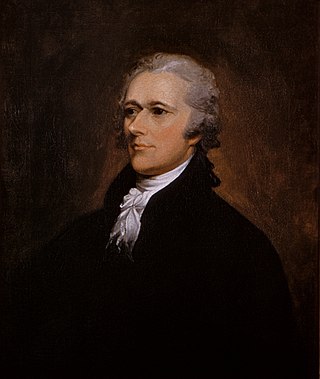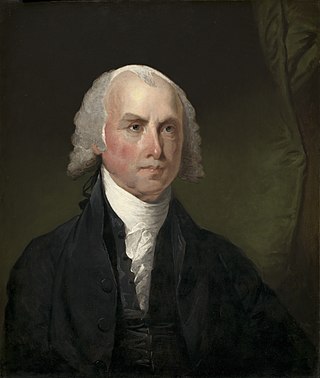
The Federalist Papers is a collection of 85 articles and essays written by Alexander Hamilton, James Madison, and John Jay under the collective pseudonym "Publius" to promote the ratification of the Constitution of the United States. The collection was commonly known as The Federalist until the name The Federalist Papers emerged in the 20th century.

Federalist No. 78 is an essay by Alexander Hamilton, the seventy-eighth of The Federalist Papers. Like all of The Federalist papers, it was published under the pseudonym Publius.

Federalist No. 35 is an essay by Alexander Hamilton, the thirty-fifth of The Federalist Papers. It was first published in The Independent Journal on January 5, 1788 under the pseudonym Publius, the name under which all The Federalist papers were published. This is the sixth of seven essays by Hamilton on the controversial issue of taxation. It is titled "The Same Subject Continued: Concerning the General Power of Taxation".

Federalist No. 64, titled "The Power of the Senate", is an essay first published in The New York Packet on March 5, 1788, by John Jay as part of the ongoing Federalist Papers. Throughout the Federalist Papers, James Madison, Alexander Hamilton, and Jay emphasize the particular role in the field of foreign affairs (Golove). However, Federalist No. 64 specifically focuses more deeply on the concept of treaties and how they are formed. This essay in the Federalist Papers is very influential, discussing the idea of treaties, the mystery behind the author, and the invalidity of the Anti-Federalists' argument.

Federalist No. 41, titled "General View of the Powers Conferred by the Constitution", is an essay written by James Madison as the forty-first of The Federalist Papers. These essays were published by Alexander Hamilton, with John Jay and James Madison serving as co-authors, under the pseudonym "Publius." No. 41 was first published by The New York Packet on January 19, 1788 and argues about the necessity of the powers the Constitution vested upon the general government as well as the meaning of the phrase "general welfare".

Federalist No. 66 is an essay by Alexander Hamilton, the sixty-sixth of The Federalist Papers. It was published on March 8, 1788, under the pseudonym Publius, the name under which all The Federalist papers were published. The title is "Objections to the Power of the Senate To Set as a Court for Impeachments Further Considered".

Federalist No. 67 is an essay by Alexander Hamilton, the sixty-seventh of The Federalist Papers. This essay's title is "The Executive Department" and begins a series of eleven separate papers discussing the powers and limitations of that branch. Federalist No. 67 was published under the pseudonym Publius, like the rest of the Federalist Papers. It was published in the New York Packet on Tuesday, March 11, 1788.

Federalist No. 68 is the 68th essay of The Federalist Papers, and was published on March 12, 1788. It was probably written by Alexander Hamilton under the pseudonym "Publius", the name under which all of the Federalist Papers were published. Since all of them were written under this pseudonym, who wrote what cannot be verified with certainty. Titled "The Mode of Electing the President", No. 68 describes a perspective on the process of selecting the chief executive of the United States. In this essay, the author sought to convince the people of New York of the merits of the proposed constitution. Number 68 is the second in a series of 11 essays discussing the powers and limitations of the executive branch and the only one to describe the method of selecting the president.

Federalist No. 69 is an essay by Alexander Hamilton, the sixty-ninth of The Federalist Papers. It was published on March 14, 1788 under the pseudonym Publius, under which all The Federalist papers were published. The title is "The Real Character of the Executive", and is the third in a series of 11 essays discussing the powers and limitations of the Executive branch in response to the Anti-Federalist Papers, and in comparison to the King of England's powers.

Federalist No. 70, titled "The Executive Department Further Considered", is an essay written by Alexander Hamilton arguing for a single, robust executive provided for in the United States Constitution. It was originally published on March 15, 1788, in The New York Packet under the pseudonym Publius as part of The Federalist Papers and as the fourth in Hamilton's series of eleven essays discussing executive power.

Federalist No. 71 is an essay by Alexander Hamilton, the seventy-first of The Federalist Papers. It was published on March 18, 1788, under the pseudonym Publius, the name under which all The Federalist papers were published. Its title is "The Duration in Office of the Executive", and it is the fifth in a series of 11 essays discussing the powers and limitations of the executive branch.

Federalist No. 73 is an essay by the 18th-century American statesman Alexander Hamilton. It is the seventy-third of The Federalist Papers, a collection of articles written to promote the ratification of the United States Constitution. It was published on March 21, 1788, under the pseudonym Publius, the name under which all The Federalist papers were published. Its title is "The Provision For The Support of the Executive, and the Veto Power", and it is the seventh in a series of 11 essays discussing the powers and limitations of the Executive branch of the United States government.

Federalist No. 74 is an essay by Alexander Hamilton, the seventy-fourth of The Federalist Papers. It was published on March 25, 1788, under the pseudonym Publius, the name under which all The Federalist papers were published. Its title is "The Command of the Military and Naval Forces, and the Pardoning Power of the Executive", and it is the eighth in a series of 11 essays discussing the powers and limitations of the Executive branch.

Federalist No. 75 is an essay by Alexander Hamilton and seventy-fifth in the series of The Federalist Papers. It was published on March 26, 1788 under the pseudonym Publius, the name under which all The Federalist papers were published. Its title is "The Treaty Making Power of the Executive", and it is the ninth in a series of 11 essays discussing the powers and limitations of the Executive branch.

Federalist No. 76, written by Alexander Hamilton, was published on April 1, 1788. The Federalist Papers are a series of eighty-five essays written to urge the ratification of the United States Constitution. These letters were written by Alexander Hamilton, James Madison, and John Jay under the name of Publius in the late 1780s. This paper discusses the arrangement of the power of appointment and the system of checks and balances. The title is "The Appointing Power of the Executive", and is the tenth in a series of 11 essays discussing the powers and limitations of the Executive branch. There are three options for entrusting power: a single individual, a select congregation, or an individual with the unanimity of the assembly. Hamilton supported bestowing the president with the nominating power but the ratifying power would be granted to the senate in order to have a process with the least bias.

Federalist No. 77 is an essay by Alexander Hamilton, the seventy-seventh of The Federalist Papers. It was published on April 2, 1788, under the pseudonym Publius, the name under which all The Federalist papers were published. The title is "The Appointing Power Continued and Other Powers of the Executive Considered", and it is the last in a series of 11 essays discussing the powers and limitations of the Executive Branch.

Federalist No. 79 is an essay by Alexander Hamilton, the seventy-ninth of The Federalist Papers. It was published in a book collection on May 28, 1788, but first appeared in a newspaper, where most readers would have seen it, on June 18 of that year. It appeared under the pseudonym Publius, the name under which all The Federalist papers were published whether they were written by Hamilton, John Jay, or James Madison. Its title is "The Judiciary Continued", and it is the second in a series of six essays discussing the powers and limitations of the judicial branch.

Federalist No. 80 is an essay by Alexander Hamilton, the eightieth of The Federalist Papers. It was published on June 21, 1788 under the pseudonym Publius, the name under which all The Federalist papers were published. It is titled "The Powers of the Judiciary", and it is the third in a series of six essays discussing the powers and limitations of the judicial branch.
In the United States, term limits, also referred to as rotation in office, restrict the number of terms of office an officeholder may serve. At the federal level, the 22nd Amendment to the United States Constitution limits the president of the United States to two four-year terms. State government offices in some, but not all, states are term-limited, including executive, legislative, and judicial offices. Research studies have questioned the benefits of term limits.
The Ineligibility Clause is a provision in Article 1, Section 6, Clause 2 of the United States Constitution that makes each incumbent member of Congress ineligible to hold an office established by the federal government during their tenure in Congress; it also bars officials in the federal government's executive and judicial branches from simultaneously serving in either the U.S. House or Senate. The purpose of the clause is twofold: first, to protect the separation of powers philosophy ; and second, to prevent Congress from conspiring to create offices or increase federal officials' salaries with the expectation that members of Congress would later be appointed to these posts.





